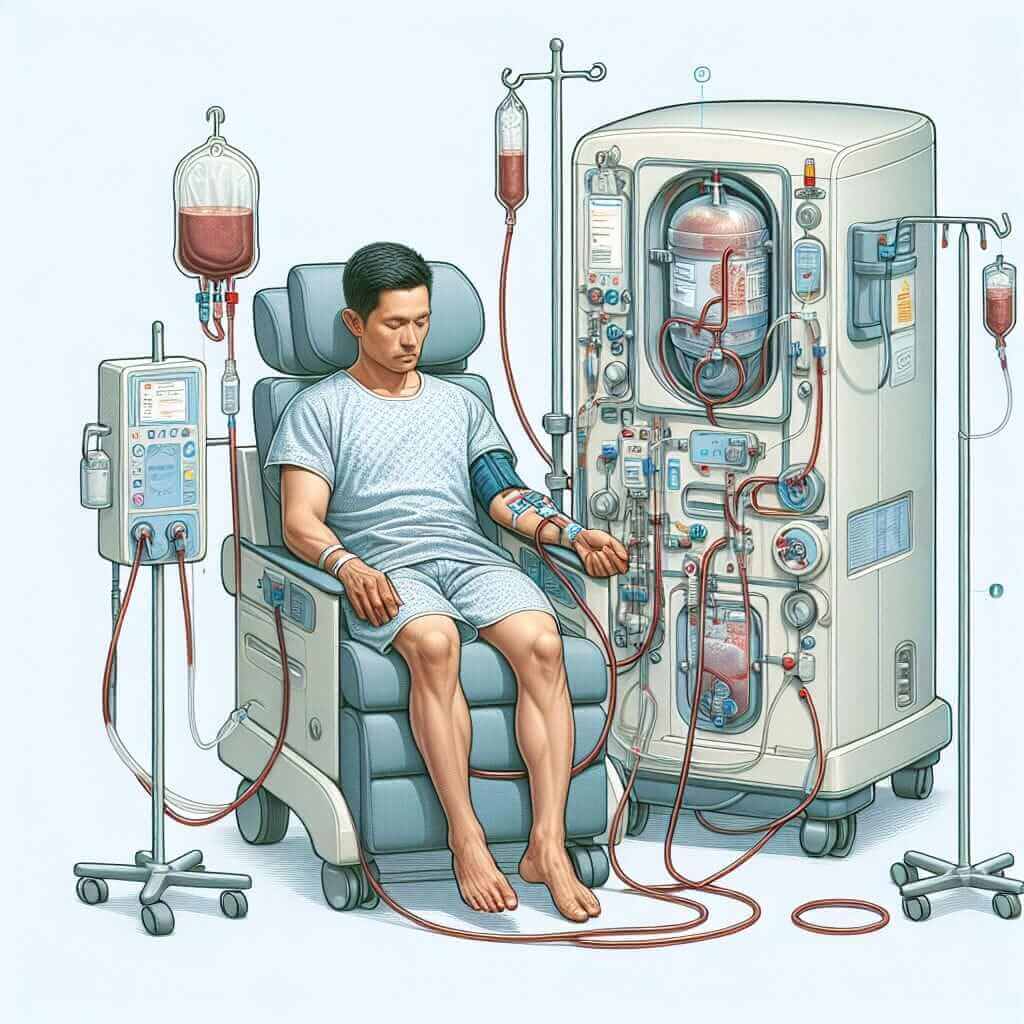The word “dialysis” (/daɪˈæl.ə.sɪs/) is a noun that falls under the umbrella of medical vocabulary, a crucial area for those aiming to excel in the IELTS exam. This word refers to a medical procedure that performs the function of the kidneys when they fail, filtering waste products from the blood. Mastering this term, along with its synonyms like “renal replacement therapy”, “hemodialysis,” and “peritoneal dialysis,” can significantly enhance your vocabulary score and overall performance.
Understanding Dialysis
What is Dialysis?
Dialysis is a life-sustaining treatment used when a person’s kidneys no longer function properly. It’s essentially a way to artificially replicate the blood filtering process that healthy kidneys perform.
Types of Dialysis:
- Hemodialysis: This is the most common type, where a machine filters the blood outside the body.
- Peritoneal dialysis: In this method, the lining of the abdomen (peritoneum) acts as a natural filter.

Dialysis in the IELTS Exam
You might encounter the word “dialysis” in various sections of the IELTS exam:
- Listening: You might hear it in a conversation about health issues, a lecture on medical advancements, or even a news report about healthcare.
- Reading: Passages discussing kidney diseases, medical treatments, or the impact of technology on healthcare might use this term.
- Writing Task 2: An essay question could be related to the importance of healthcare access, advancements in medical technology, or the challenges faced by patients with chronic illnesses.
- Speaking: During the speaking test, you might be asked about your views on healthcare, your personal experiences with illness, or your knowledge of medical treatments.
Using “Dialysis” in Your IELTS Exam
Here are some examples of how you can effectively incorporate “dialysis” and related vocabulary into your IELTS responses:
1. Listening:
- Script: “The patient has been undergoing dialysis three times a week since his kidneys began to fail.”
- Question: What medical treatment is the patient receiving?
- Answer: The patient is receiving dialysis.
2. Reading:
- Text: “The invention of dialysis revolutionized the treatment of kidney failure, offering patients a new lease on life.”
- Question: What was the impact of dialysis on the treatment of kidney failure?
- Answer: Dialysis revolutionized the treatment of kidney failure, providing patients with a life-saving option.
3. Writing Task 2:
- Question: Discuss the challenges and benefits of advancements in medical technology.
- Response: “Advancements such as dialysis have been a boon for patients with kidney failure, offering them a chance at a longer life. However, the high cost and accessibility of such treatments remain significant challenges.”
4. Speaking:
- Examiner: What are your thoughts on the future of healthcare?
- Candidate: “I believe that the future of healthcare will see even more advancements in treatments like dialysis, making them more effective and accessible to everyone.”
Collocations with “Dialysis”
To further enhance your vocabulary and demonstrate fluency, use “dialysis” in combination with other words:
- undergo dialysis
- require dialysis
- dialysis treatment
- dialysis patient
- home dialysis
Idioms and Expressions
While there are no specific idioms using “dialysis,” you can use related phrases:
- On borrowed time: This can be used to describe someone who is alive because of a life-saving treatment like dialysis.
- A new lease on life: This signifies a fresh start or a second chance at life, often experienced by patients who start dialysis.
Conclusion
By understanding the meaning, application, and various forms of the word “dialysis,” you equip yourself with a powerful tool for success in the IELTS exam. Remember to practice using this vocabulary in context to solidify your understanding and improve your fluency. Don’t forget to explore other medical terms related to chronic illnesses and treatments to further enhance your lexical resource for the IELTS.